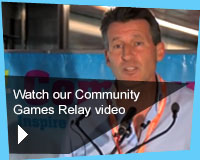Using the Media
Generating media coverage is extremely beneficial in attracting participants to your Community Games. With a little effort and creativity you could see some amazing results by generating more local awareness and engaging members of your community who may not have been engaged otherwise.
Here are a few easy steps to help generate awareness of your Community Games:
Compile a ‘media list’
Compile a list of local newspapers, magazines (especially those with ‘What’s On’ sections), radio and television stations. Ring the main switchboard number to identify the best person to speak to regarding the event – this will most likely be the arts, community or sports editors.
Inform your local media
- As soon as you know the exact programme and times for your Community Games, call your local newspaper and radio station and ask them to publicise these details for you. The sooner your local community knows about your Community Games, the more likely they are to want to enter or take part.
- Write a press release with all the details a couple of weeks before the event. You can download some hints here.
- Also check out your local council’s website, they often have a free event listings section. Upload your details there.
- Make sure to send another press release after the Games - it's another chance for some free publicity for your event and organisation, Again, you can download some hints here.
- Follow up your emails with a telephone call to check the journalists have all the information they require.
Make your Community Games an attractive prospect for your local media
Building strong relationships with your local media is a great way of increasing your chances of gaining coverage of your Community Games. Here are some suggestions of how to achieve this:
- Encourage a local reporter to take part in one of the events or activities - suggest they write a diary-style piece of their experience on the day.
- Organise a photo shoot, making it as exciting and colourful as possible (e.g. local service men and women competing, community groups, fancy dress, carnival atmosphere etc).
- Offer to visit a newspaper’s office or radio station to talk about the Community Games and discuss what is happening e.g. human-interest stories, community challenges, celebrity visits etc. You could also arrange an over-the-phone interview with the local radio station.
‘Launching’ your Community Games
A period of around six weeks prior to your Community Games is a good time to really announce the event through the local media. This is an optimum time to do this as it is not too far in advance and not too close to the event, meaning that interest should be high.
Human interest stories
Local media rely on hearing about stories involving local residents. The fact that you are organising a Community Games for your own community on its own is a great story, but add some colour by profiling people (such as a local football team who are taking part, a community group who are helping to organise etc) to make the story more interesting.
Good, interesting photos will also help you get coverage. Take your own photography to send to media:
- Try to take professional photos that can be used by your local newspaper. You may have local residents who are photographers – ensure you investigate this possibility.
- Don’t forget to include a description with the photo and rename the file with the names of the people in the photo. Also don’t forget the date it was taken, the venue and a contact name and number of someone who can talk about the photo and the event.
- Contact the papers you have sent photos to, making sure that the correct person has received them and to see if and when it will be used.
- Building up a stock of photos is also useful should any be required for the Community Games website.
Top tip: Don’t forget: you need to obtain permission to take and use people’s photographs, particularly if you are going to be sending photographs to local media. To take photos of children and young people, you need the permission of their parent/guardian.










